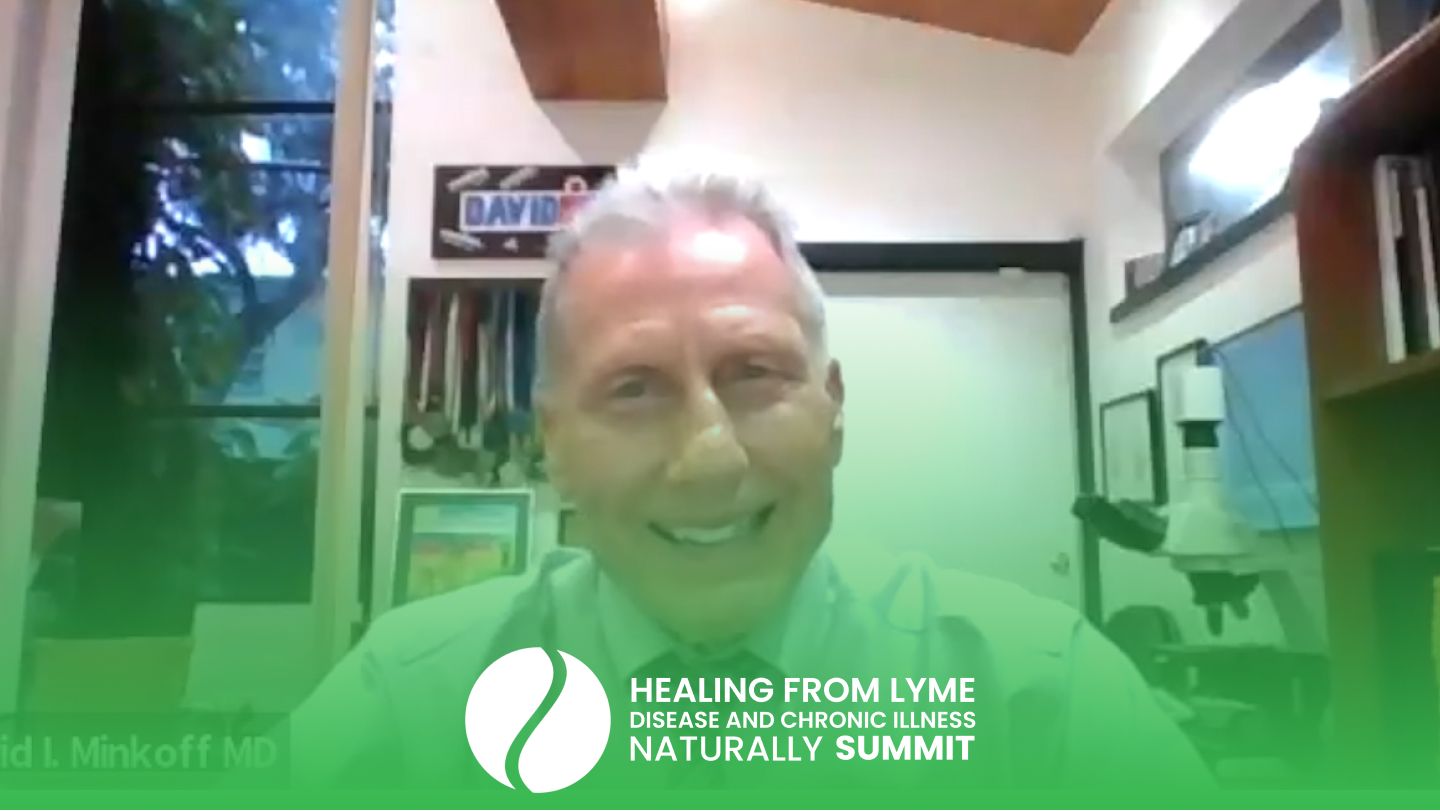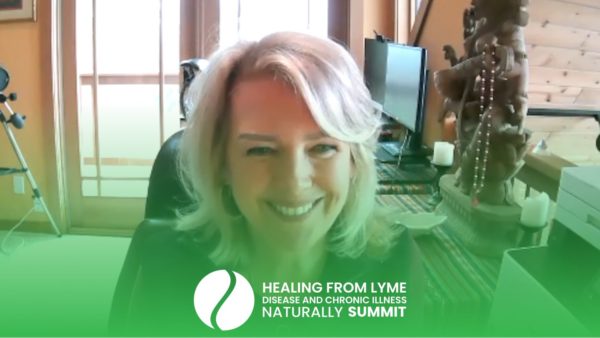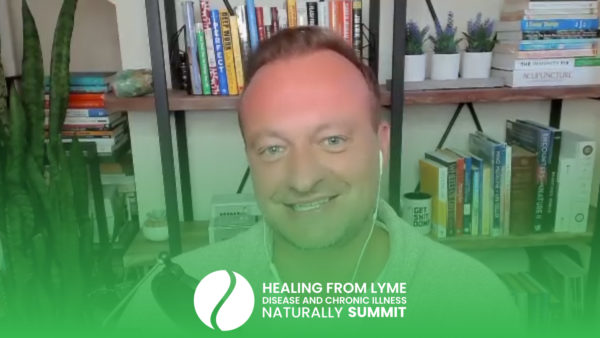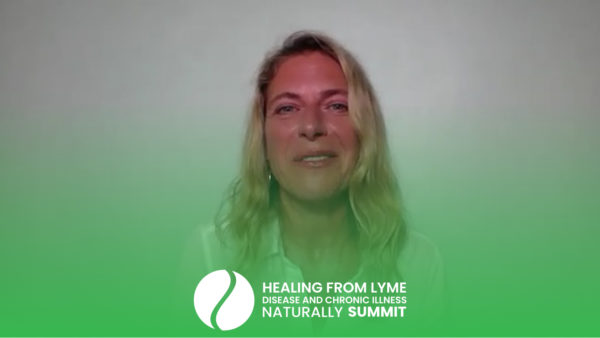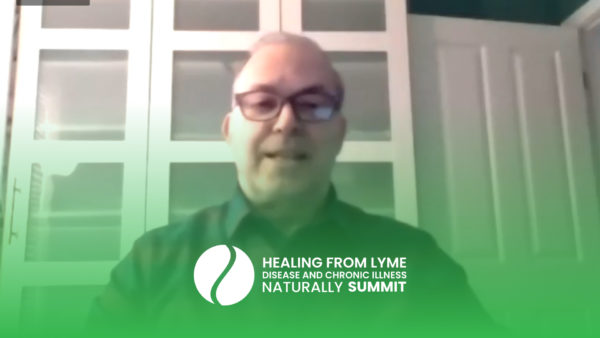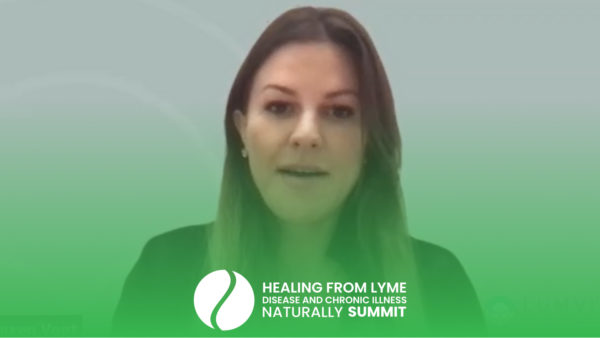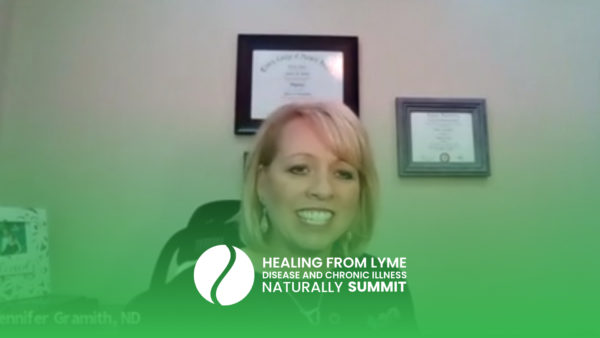Join the discussion below
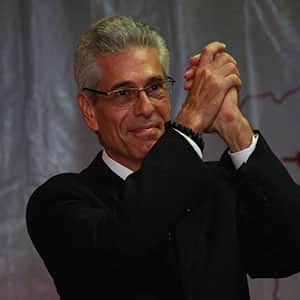
Rob Besner, PSc.D, Co-Founder and Chief Science Officer of Therasage, has always been an advocate of natural health and wellness. Graduating from Boston University in Pre-Med, Engineering, Psychology and Business, he continued onto post graduate work at Case Western Medical School and Holistic Medicine After many years of illness, Mr.... Read More
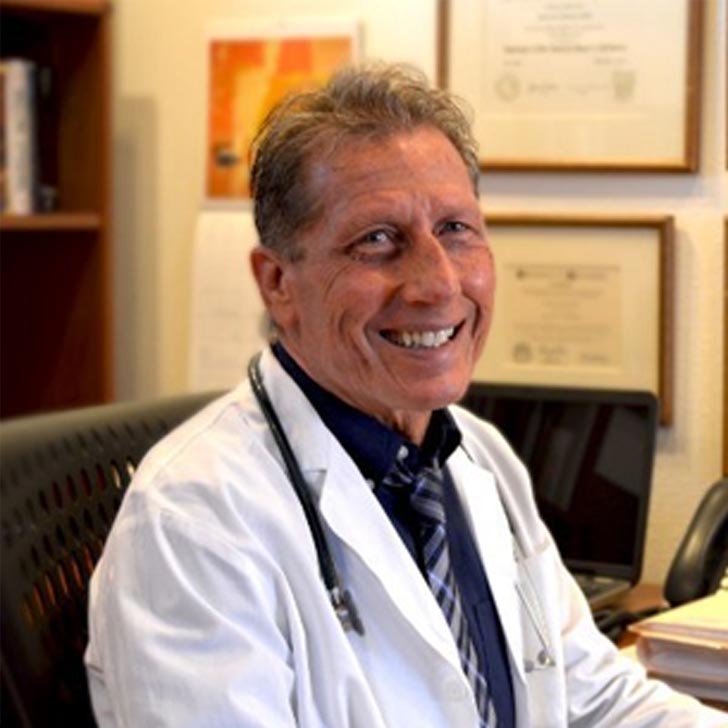
Dr. Minkoff is an alternative healthcare expert, guest lecturer, writer, tv and radio show guest. He also authors two weekly newsletters, the BodyHealth Fitness Newsletter and the Optimum Health Report. Dr. David Minkoff graduated from the University of Wisconsin Medical School in 1974 and was elected to the “Phi Beta Kappa” of medical schools, the... Read More
- Discover helpful tools and tips for creating a primal sustainable healing platform that can be applied as soon as tomorrow.
- Understand how protein deficiency and heavy metal toxicity can lead to chronic illness.
Related Topics
Chronic IllnessRobby Besner PSc.D.
Hey, everybody. Welcome back to the Healing from Lyme Disease and Chronic Illness Naturally Summit. And today, I have an all star, today, as a speaker and a guest. His name is Dr. David Minkoff. He’s got a practice in Florida. I’ve known this guy for years. We go to conferences, he’s a keynote speaker. I’m going through all the things that he’s done, and it’s such a long list that it’s hard to believe that anybody has achieved as much as Dr. Minkoff has done in his short time on this planet. But he has some supplements and he’s got some keys to, particularly as you age, and that’s important to me, how to maintain your body vitality, how to maintain your muscle mass. He is an Ironman. And I think just looking at your resume, I worked up a sweat myself, just looking at all the things that you’ve done, David. So I don’t even think that you need to compete as an Ironman. You just need to do what you do in a daily day and that’s an Ironman activity in itself. So Dr. Minkoff, welcome to the summit. Thank you for joining us and carving out some time to share your wisdom with all the people watching. How are you doing today?
David Minkoff, M.D.
I’m doing amazing. Yeah. I’m happy to be here. I’m happy to be included in this. And Lyme’s one of my passions in life. I see people all day long with Lyme, have for years and years so I’m happy to share what I know because there is hope for people with Lyme. And most of the stuff that they’ve been told or that’s been done on them that didn’t work, it wasn’t the right thing to do with them and that’s why it didn’t work.
Robby Besner PSc.D.
Well, I noticed that you have a, I wanna say an original approach because generally an MD or an allopathic, they like to kind of zero in on the enemy or very specific, let’s say root cause. You treat the whole body. And that’s what I think is really significant because it isn’t just a carve out. There’s many complex relationships between all the systems in the body and certainly the relationship to the microorganisms, bacterias, your internal biome and microbiome. And you seem to have grasped that and wrapped your head around it. Could you spend a few minutes and just give us a little backdrop of Dr. Minkoff. I know that you’ve been for decades, you worked in as a specialist in infectious disease. So give us a little bit of the backdrop and then kind of walk us forward to the things that you are doing that’s special in clinic today.
David Minkoff, M.D.
Sure. So, I was the first language major to ever get into medical school where I went. I thought I was gonna be a lawyer and a writer. And I ended up being a doctor because I had two uncles that were doctors and I liked what they were doing and so I just, in my third year of college decided to pursue medical school. So, I didn’t know what kind of doctor I wanted to be. And I went to, back then, this was in the late seventies, middle seventies, I did a rotating internship because I wasn’t sure which branch of medicine I was gonna go in after medical school. And this way, you could do three months of pediatrics and three months of internal medicine, three months of surgery, three months of gynecology. And my first rotation was pediatrics. I was at UC San Diego in University of California, San Diego Pediatric Program.
It was one of the best programs in the country. And the first three months rotation were pediatrics. And the head of the department there after I was there for the three months doing the internship, he said, “You’d make a good pediatrician.” And I thought, “Well, he thinks I’d be a good pediatrician. “I’ll be a pediatrician.” And sort of stopped. So I did some internal medicine and then I did the, so it was the first year actually was pediatric residency, did two more years and then I did a, I didn’t know what kind of pediatrics I wanted to do when I was done. And they offered me to be chief resident at University of California. So I was running the training program for pediatric residents. And the three hospitals was a big, big job, running the ICU. And I did that for a year. And then I wasn’t sure what I was gonna do either. And one of the guys who was in the infectious disease department and they had a very renowned infectious disease department there, said, “Why don’t you do a fellowship in infectious disease?” And so I did fellowship and infectious disease.
And I did research on antiviral drugs and we did three hospitals doing pediatrics and adult infectious disease. And when I finished that, I got recruited by a guy in town who was an infectious disease doctor. And I joined his practice and I did infectious disease. This was in the early eighties, it was the AIDS epidemic. And I learned a lot about antibiotics and bacteriology and infections. And little did I know that 20 years later I’d be, have a Lyme, basically a Lyme practice where I would be doing infectious disease. So I’m not adverse to antibiotics or those sorts of things, but it turns out that Lyme is a very unique organism and antibiotics really are not very helpful for people who have it chronically. And then along the way, I got interested.
In my first year in medical school, my father had a massive heart attack at age 50 and it inspired me that I better start exercising. So I started running. When I got to San Diego, there was a running boom there. So I ran five different marathons. And then I got interested, I saw, some of the old folks might have remembered on TV, there was a show called “Wide World of Sports”. It was on every Saturday afternoon, ABC and they showed this race that was called the Ironman. And it was a race where it was at Kona, Hawaii. And you swam 1.2 out in the middle of the ocean and you went around a boat and you swam back to shore and then you rode a bicycle up to the top of the mountain, Hawi. It’s 56 miles north of the thing along the ocean. It’s very windy. It’s really hot. The pavement there, it’s all this black lava fields that you’re riding through. And the pavement there was 140 degrees.
So it was very hot, very windy. And then when you get back to town, you run a marathon. So you run 13 miles out of town and 13 miles back. And we saw it on TV and it was very dramatic because the two people at the end of the race, the two women that were winning were both from San Diego. And the woman who was winning, about a hundred yards before the finish line, collapsed. And she tried to stand up and she tried to crawl and she would fall down again and you weren’t allowed to get any outside help from anyone. And then the woman in second place ran by her and won the race. And I was sitting on my couch with my best friend and we saw this dramatic ending and we looked at each other and we said, “We have to do that race.”
Robby Besner PSc.D.
Whoa.
David Minkoff, M.D.
So he said yes. And he was in the financial services business. And he said, “You give me all your extra money. “And in five years we’ll both be rich and we’ll retire “and we’ll train and do the race.” I said, “Okay.” But that night I couldn’t sleep. I said, “The last guy I gave money to lost it all. “And I can’t wait five years.” And the next morning I found a used bicycle in the newspaper and I joined a swim program at the Y. And eight months later, I was in Hawaii at the start doing my first Ironman World Championship Triathlon. So done 43 of those since then. And so that’s the other part of my life is that while I’m involved a lot with sick people and our practice is Lyme and mostly cancer or chronic disease, MS, things like that, I have a whole other side of me, which is interested in performance and fitness and nutrition. So the two really compliment each other. So that’s my story.
Robby Besner PSc.D.
Well, I think it’s kind of important for people tuning in to understand, because it seems like when you’re battling a chronic ailment, and now we’re focusing on the co-infections in Lyme disease, that it is almost like an Ironman competition. And in many ways, particularly about the struggle and the challenges from the physical side, but the emotional piece, as well as having fortitude and the vision to be able to finish the race. And that’s really what we’re doing today. That’s what we’re doing with the summit is bringing a collective of great minds that all have similar and different approaches to the solution. But it takes the individual. This isn’t about you, it’s about me that has Lyme and what I can gleam from you and your practice as we work together. So that I get on that bike and I win the race to get back to my health, maybe the new me or the optimal me. But even in your practices now, besides all the things that you’re doing for Lyme and cancer and infectious disease, you also work with like pro-athletes and people that are already optimal health, trying to maintain that level and keep dialing it up.
And I think that’s also important for everybody here to know, because certainly, we have Lyme people, patients that might be listening that aren’t having such a good time with it. And then we have people that have, are actually functioning and they want to maintain that level, or keep dialing it up even more. And so having you on and having your scope just from your own personal journey and experience, seeing both sides, treatment and also maintaining and dialing up optimal health is an important feature for us to understand and highlight. So, let’s talk about Lyme a little bit because I know it’s a big part of your practice. What kinds of things do you use, or do you do in your practice that you feel separate you a little bit from the other guys on the block?
David Minkoff, M.D.
Okay. See, I think Lyme is an opportunist type of infection. In my infectious disease practice, I saw people that had flesh eating strep, where in an number of hours, you could see the muscle in a calf deteriorate, almost eaten up to nothing. And I’ve seen young 16 or 18 month old kid with plague who died in my arms while driving from my office to the hospital because it was so overwhelming, it’s so fast. I helped publish some papers on what was called Scalded Skin Syndrome. And sometimes they were women that forgot that they’d left a tampon in and it got infected with a particular strain of staphylococcus which caused massive, the skin would just erupt and tear off. Or meningococcal meningitis. These are infections which, or Ebola. These are infections which are very devastating, very rapid, and they can overwhelm almost any host. Lyme is not like this at all.
Lyme is an opportunist. 99% of people who get Lyme never saw the tick, never saw the tick bite, never got the bullseye rash, never got, the sort of body aches, fever, anything. They didn’t have it because it’s a very low level organism. And I think that probably 90% of us walking around, if you did very sensitive lab testing, you’d find that we have antibodies to these bugs or on PCR testing. When DNA Connections, it’s one of the labs that does Lyme testing, when they were piloting their test, they went to downtown Colorado Springs and they pulled a hundred people off the street who were not sick people. And they did an hour offing massage on them and then they collected urine and did PCR testing for Lyme and 90 out of a hundred were positive.
So this thing is everywhere and especially now. Infectious disease is a cycle. So when I was growing up, everybody got strep and we all got our tonsils out. And now you never take people’s tonsils out because strep just isn’t around very much. So now Lyme, we are in a Lyme heyday now and it’s around and there’s a lot of people affected, but virtually of those people have other things going on that they, as a host, can’t handle this relatively low level bug. And I think the key to this is what else is going on in that person? You can’t really take someone with fourth stage Lyme or chronic Lyme and give them Ivyloceprin for a month or five oral antibiotics for a year and think, and this is routine infectious disease practice now, and think that you’re gonna get that person better. You’re just gonna hurt them more with medicines than you are.
And they might feel a little bit better, but as a long term solution, it just doesn’t work. And so these guys have other stuff going on. They have parasites and low level viruses and mycoplasmas, and abscess teeth, and, upper cervical, neck’s out of adjustment, they have other stuff. And the only way I found to get these people better, and almost everybody we see, they get better is because we really do a very broad approach to what is in them that shouldn’t be. They might have very high levels of glyphosate or, 6-Bromopropane, or these environmental toxins in very high levels. They might be living on a moldy mattress or in a moldy room and they’ve got tons of mold toxins in them.
And unless you are able to sort of get this whole picture of this person, because at one point in their life, one year, five years, 10 years, they were fine. They weren’t sick, they didn’t have Lyme. They went to school, they got married, they had children, whatever it was. And now, in some cases they can’t work, they can’t think, they can’t remember, they’re anxious, they’re depressed, they can’t sleep and their life is in a mess. And it’s not genetics. It’s not bad karma. There are physical universe things that you can identify so that that person can actually be figured out and then you can do things that will help them. And that’s really an important, I mean, that is the key to this thing. And if you’re gonna help people get better, that’s what I, in my experience, that’s how we do it.
Robby Besner PSc.D.
Wow. Well, that’s really amazing. And clearly, there’s all these components, including the emotional component. I want to just comment. I was teaching at Hippocrates Health Center here in South Florida on the East Coast for better part, almost 20 years. And 20 years ago, I would ask the question because the reason why I’m here today and so sensitive to Lyme was because our oldest child, Julia, had contracted Lyme disease in her early teens. And so we’ve always been very passionate about Lyme and the process. And so teaching at Hippocrates, I’d always ask my group, between 30 and 50 guests, how many of you, this is 20 years ago, how many of you either have Lyme or know someone that has Lyme? Out of 50 people, I would get maybe 10%, five, six people. After five years, it was up to 30%. After 10 years, it was up to 70%. And then just recently, I mean, almost everybody in the room either has it or knows someone that has Lyme disease.
And this is one that you know even from your own practice and people listening, it’s very misunderstood but often misdiagnosed because the way that expresses itself from person to person mimics makes many other chronic ailments. And unless the practitioner, like yourself is smart enough, either Lyme literate or smart enough to ask the right questions, they just go off their checklist, they get misdiagnosed. Then the patient’s being treated for what they don’t have and not treated what they do have. That’s kind of a pretty bad combination right there itself. And then they go from doctor to doctor till they find, hopefully find someone like you that can unravel the process. And doesn’t go by the label of the diagnosis that was given to them by the practitioners before them, before you. You like to look at the variables and understand what they are for yourself in your own eyes.
And I think, once again, that’s an important thing for people to know, particularly when they’re challenged and also to understand that there’s practitioners out there like yourself that’s well seasoned, that’s on the cutting edge of what’s important to know in terms of treatment. And you treat the whole body, like we said earlier. And I think that understanding those complexities with the overlay of the complexity of the underlying challenge itself, the imbalance of microbes could be the co-infections one time, or maybe it’s the Lyme itself and then it transfers to the co-infections. It is complex and it needs to be treated as such.
David Minkoff, M.D.
Right. I think the other loophole that people get stuck in is they know there’s something wrong with them. And for most of the standard labs in the United States, the diagnosis of Lyme is not made because the labs, it’s not that they’re not good labs. It’s that the things that they’re looking at aren’t expressed in most people with Lyme or the standards that have been set by infectious disease societies and so forth as to, you need this many bands, or you need this and this and this, that they don’t relate to the organism. They’re not looking at the right thing. It’s kind of like what’s going on with the current virus. Like the PCR tests aren’t any good. They’re not reliable. Now we know, but it’s not a reliable test to make a diagnosis.
So Lyme is in the same boat. So if you go to Labcorp or Quest and they do a standard Lyme panel, chances are it’s gonna be negative even when you have Lyme. And so you have to sometimes rely on better labs and looking differently. One of the things I do on every patient that I see is I look at their blood under a microscope. And when I was an infectious disease fellow, we would, if we had a patient that was suspected to have Syphilis, now this is an acute Syphilis. This is, they got Syphilis a long time ago. Syphilis is a spirochete, which is the same class of bacteria that the Lyme spirochete, Borrelia is. And we would go, we would sit with the gray bearded professor every morning in the lab and we would look under the microscope at lab specimens.
And you could see the spirochete keeps swimming around in their blood if you have the right type of microscope. And so I just, 15 or 20 years ago, my teachers were Swiss and German and they used these microscopes. So I bought the microscope and I started looking at blood. And one of the things that was the most revealing to me is that people who were complaining for years and years and years, and they had gone to doctors and there’s nothing wrong with you and the CBC and the Chem 25 and the physical exam were fine. And they got labeled as menopausal, depressed, whatever and put on psych meds, but they were actually sick. And so I would look at the person, their physical exam really looked pretty good. I got a history of all these complaints.
They were fatigued and they had this and they had pain and blah, blah, blah, and all subjective complaints. On the exam, I didn’t see it. And then I would walk them over to the microscope, take a drop of blood from their finger, put it on the microscope and the blood would look horrible. I would see biofilms and inflammatory markers and red blood cells that were encircled by Olichia, one of the Lyme bacteria. And we’d see spirochetes swimming through the field. And I would look at the patient and I would say, “You’re not crazy. “You are sick.” And that would be like the first time they heard that ever from a doctor and the relief that it would be bring was just incredible.
And it was obvious that if a doctor had taken another little bit of an adjacent look, this is normal medicine. I mean, I learned this in infectious disease program that these tools are available to doctors. There’s a little bit of training involved, but it isn’t that complicated, that you can use these other tools to actually figure out what’s wrong with that person rather than do a superficial look across the room. “Oh, you got this. “Here’s some Prozac, here’s some Xanax. “Go home, take, okay, we’re gonna do Rocephin for a month,” and not really get to the bottom of it. And then as a physician, I mean, you have to be very interested in this patient as a problem and help them solve the problem. And I think when that happens, then there’s a relationship that occurs between the doctor and the patient where I am on their team, we are a team and that we can then work through this together.
So that my goal, and I tell them this on the first visit, how long is the treatment gonna be? And I say, “The treatment’s gonna be until you come in here “for a recheck visit and you tell me you feel great “and you’re done.” And that’s what happens. When we get to the point where we’ve thinned this stuff out to the point where their health has regained and their vitality is regained, then they feel good and then they get their life back. So that’s my goal. And it’s, sometimes it’s an Ironman. Sometimes it takes some time to work through it. And sometimes people who are way down on the scale, they’re in wheelchairs. Like the definition for me of a bad patient or of a tough patient is they’re in a wheelchair and they haven’t had a bowel movement in three weeks. That’s a really tough patient. But you know what? Even they have hope that they can get better if they can do the program because the body, if it’s alive can heal and if we can give it the right stuff and, it can.
Robby Besner PSc.D.
Amazing. I noticed that the motto on your website, lifeworkswellnesscenter.com is optimizing health and vitality, which is really what you just described, which is a journey. And I think that one of the things that you pointed out and it’s very individualistic because oftentimes chronic patients, they’re so sick and tired of being sick and tired that when they start getting some results, a little bit of hope and results, that they hit it a little bit too hard, maybe too soon, or they don’t have realistic expectations as to how long it’s gonna take for them to come out, see the light at the end of the tunnel and work through this. And it is a process, lifestyle change and process. And having someone like yourself and your team to guide us through or guide you through makes all the difference between just having a moderate result or having an optimal result. So I think that’s important. I just recently had some dental work done and the dentist there was a biological dentist and like yourself, he does do live blood analysis.
And we’ve also had it done with our daughter, Julia. Her blood looked like, when I looked at it, it almost looked like something out of “Star Wars”. The organisms that were swimming around and those spikes and the various different configurations, I just couldn’t believe it with my own eyes. When I went in for my teeth, I’ve got a spirochete that’s living in my mouth. I experienced what that looked like, because it swam across. They just took a little scrape of my tartar and wanted to show me some things. And, I was floored by what I saw that was in my mouth, which is really just the beginning of your whole, GI tract and how that is an expression of the bacteria that’s going on inside of me. And I’m not symptomatic, but maybe there will be a switch or a change or something that triggers a shift in my own health. And now all of these different things that have been either living in some kind of harmony or I haven’t been, maybe the other things that I do to detox or just in my own lifestyle has kept my immune system strong enough where I’m not expressing some kind of symptom at this point.
David Minkoff, M.D.
Right.
Robby Besner PSc.D.
So it’s really interesting to me how you use all these tools and the backdrop of your own journey in your own knowledge base to bring you to and install all these different kinds of technology in your practice today.
David Minkoff, M.D.
Yeah. And what I found is I think I have the biggest collection of technology of anybody in the country. I’m sure I do. And they all play a part and they’re all helpful. Not every patient gets everything, but I’ve all, I’ve had patients where I haven’t figured it out. What else do I need? Okay, this guy’s got this technique. Let’s go learn from him. What does he do? Introduce it in. Oh, that helped this patient. So now I got another tool and good carpenters have tool boxes so they can have the appropriate thing. And that’s what it takes for this because some of these people are very complicated and it takes a while to sort of figure them out where we can get their physiology restored. That’s really what we’re going for.
Robby Besner PSc.D.
Perfect. Well, because we have a full spectrum of people listening, can you offer a little bit of sort of helpful tips or hints that you might want to direct someone to that is listening in today, besides we’ll get into how they can find you in a minute or two. You have a few different ways. You’ve got a supplement company and then your main practice and other interests plus you’ve just written another book. I don’t know how many books you’ve published, but the latest one, I can’t wait to get. And, so, I was wondering if you could offer just a little bit of some kind of helpful hint that maybe someone, a Lyme patient, whether they’re on their back hurting or they’re optimally functioning fine, but want to maintain their health. Are there things that you could offer that people can listen to and incorporate into their lives or their daily routines as soon as tomorrow?
David Minkoff, M.D.
Sure. I think the top of the bad cases, like if you hit, if there’s three things that if you got these three things, the chances that you’re gonna heal from Lyme without handling them are in my experience, zero. So if you have root canal teeth, you will never get better if you have Lyme. You just will never get better. You have to go to a biological dentist who knows what they’re doing so that they can clean you up. These are dead infected teeth. They poison you, they kill your immune response. So that’s really important. If there’s mold in your body and you’re one of these gene, you have this genetic type where you are a mold sensitive person, you can’t live in a moldy area. This might be your office or it might be your house or your bedroom or your mattress. You will never get better with Lyme if there’s mold in your house.
And so you can go to good dentists and get cone beam CT scans to see what your teeth look like. I have everyone do that. I saw a patient today that had had a full mouth reconstruction. 12 implants on the top and nine implants on the bottom. The teeth looked like Chiclets, like beautiful, if you ever see a Chiclet, they’re like a white candy. I mean, they were just like, wow. And I sent them over for a cone beam because this person had brain fog and they had actually trouble talking to me. And this person has a company with a thousand employees. They were a very successful person. And now they’ve hired someone to like take care of him and he is only 55 years old.
Robby Besner PSc.D.
Wow.
David Minkoff, M.D.
And he spent $60,000 on his mouth. And I sent him over for the cone beam and I get it back and he’s got like eight abscessed implants.
Robby Besner PSc.D.
Oh my God.
David Minkoff, M.D.
Now that is a horrendous thing, but he’s never gonna get better till his mouth is better. And that’s really important. So you gotta have a healthy mouth and you can’t be in mold and you gotta look for mold. There’s a million charlatan mold inspectors out there who don’t know what they’re doing. And you have to find someone or get educated yourself and look. Is it mold? And so we have tests to see if there’s mold in people’s bodies. We do those, but then you gotta get somebody to figure out where is it? And I just had a super interesting case. These people were from South Florida. It’s a husband and wife.
They came up to see me. They both had brain fog and fatigue, and I tested mold on them and I sent them, and they had Lyme too, but I sent them to go get their house inspected. And they found that there was a room that had mold and they demolished the thing and they thought it was okay. But three months later, and after lots of treatments, when I retested them, they still had mold. And by accident, she found that when she unzipped the zipper covering the mattress on their sleep number bed,
Robby Besner PSc.D.
Oh my God,
David Minkoff, M.D.
that the bladder was black with mold and they were sleeping on it every night. And the mold inspector wasn’t getting it from the samples he was doing in the room.
Robby Besner PSc.D.
He’s doing the air. He’s going after the air and not-
David Minkoff, M.D.
Yeah, the air samples are worthless, but the wipe samples sometimes can be good. And he wasn’t getting it because it was underneath the mattress cover, but they’re sleeping on it and they’re laying on it. And they’re both sick and both in the same mattress. So when they got rid of that, and then we got the mold out of them, then we could treat their Lyme and then they could get better. And then if you have Lyme, that’s the third one. Those are the three baddies. Okay? So those are like, those have to be addressed and it’s really important. You can’t get better on a crappy diet. Okay? You can’t drink soda and Coke and eat chocolate bars. It’s just, you can’t do it. You have to just clean this up. We usually push people toward a paleo keto, somewhere in their food program.
Sometimes people who are vegans or vegetarians for short periods of time will feel better, but they’re all malnourished, hundred percent of them within a year. They don’t get enough protein. So, I try to move people away from that. And when we test their nutrition levels, we find that they’re just not adequate. So I try to get them on good whole food, non-packaged, organic. It’s really important. We measure chemical and pesticide levels on every patient and people, their glyphosate levels are high and they’re just, their body’s being poisoned. So if you have eight or 10 different things, between parasites and chemicals and roundup and root canals, and you look at the list of things and you say, “No wonder you don’t feel well.” And our job is to just like undo this thing.
So that’s important. Helping people get to sleep’s important. Getting out in the sun’s important, getting a little bit of fresh air in your lungs and walking around. While some people aren’t able to do that, they can usually do something. So these are important. And then I think the other thing is to find a healthcare practitioner that is passionate about getting you, the patient better. Like it’s their whole thing in life. Like my highest satisfaction in life is to have someone come in and tell me, “You helped me. “You made me feel better. I got my life back.” Okay. That’s basically what I, that’s what I live for. Okay? And I mean, I have a wife of 52 years and I have grandchildren and I love all of them, but what gets me up. My wife said this to me yesterday. So it’s Sunday night and she’s doing some part-time work.
And she said, “God, I hate Sunday nights. “Because that means Monday, I gotta get up and I gotta go, “do this job that she’s doing.” I said, hey, it’s a volunteer job. She’s helping and she likes it. And she said to me, “Don’t you feel that way?” And I said, “I don’t. “I’m ready to go because tomorrow “is gonna be a really interesting day. “Because I’m gonna meet some fascinating people “and I’m gonna figure out how I can help them. “And that’s kind of what drives me.” So I think what you wanna do is you wanna see that in a person. You wanna see that. I saw a cancer patient right before we came on here and she’s got breast cancer and it’s in different places in her body.
And she’s got an oncologist. And she’s saying, “My feet get numb.” And she told me that he sat back in his office like this and he listened to her and he said, “I don’t think it’s from your cancer. “It’s probably in your head. “I don’t have any time left. See you later.” So when she gave me the symptom tonight, I said, “Get up on the table. “I’m gonna examine your back. “I’m gonna examine your pelvis.” I found out that her SI joints were very inflamed. And she said, “You actually examined me. “You actually looked at me.” And I think this is a key thing that when you’re looking for a doctor, you wanna find someone who’s compassionate and educated, but also that they’ve got their skillset really good. And then they’ve got tools and then they can help you. And I think that’s the, that’s the really important thing.
And there’s lots of good doctors out there. And I don’t think that the two initials at the end of their name really make the difference. There’s terrific chiropractors and naturopaths and nutritionists and medical doctors. Medical doctors, you have to really be careful with medical doctors because, they’re arrogant mostly and they don’t listen. But there are people out there who are that way and that’s what you want. You want a partner.
Robby Besner PSc.D.
I love that. I absolutely love that. Everybody’s got their experiences, but certainly you covered all the primal basis for really creating primal healing. And without that foundation, I love the dental piece because aside from yourself, I’ve heard this from other doctors that I respect, that they really won’t treat you unless you have a good dental profile because they can’t heal you the way that they feel you deserve to be healed. Your body won’t respond either as quickly as it can, or the case becomes a lot more complicated when you don’t have a good dental profile. So I think that all those tips, all that advice is so, so important for everyone to hear. But probably the most is understanding who you should be surrounding yourself with. Find someone that loves you. Find someone that’s as passionate as Dr. Minkoff, that gets up every morning with the, like he is running an Ironman race to try to figure out how to get you better.
And I think that that is a wonderful bit of advice for everyone to be looking for. So if you’re out there and you’re tuning in now, then you should understand that the kinds of doctors that you should be looking for is the kind of doctor that Dr. Minkoff is. So David, thank you so much for joining us. How do people find you? You have the Lifeworks Wellness Center and then because you’ve been so, nutrition is such an important part of what you do in your regimen, you’ve also created your own supplements. I take some of them myself, so I can speak volumes to what it’s done for me, but I know that that compliments the other clinic that you’re running. So tell everybody out there exactly how people can get ahold of you these days.
David Minkoff, M.D.
Yeah, so if people are interested in coming in the clinic, three quarters of our patients don’t live in Clearwater, Florida. They come from all over. I saw people today from Minnesota and from Louisiana and from Virginia. So they come from all over and because they like what we got. I mean, we got everything here. We have peptides and ozone and EBOO and Hocatts and HBOTs. And I mean, we got everything. So I can do everything here. The N stem cells. And I mean, we got everything. So that’s Lifeworks Wellness Center. You go to lifeworkswellnesscenter.com and you can see, I don’t know, there’s a few hundred videos, YouTube videos that I’ve done, and there’s a lot of information.
And then you can call and talk to someone and see would it be, would it work for you? Okay? The other place that I’m active is, it’s a website called bodyhealth.com. I have nutrition company called Body Health. We manufacture very fine nutritional supplements. And there’s hundreds of videos on that site. There’s a free download of the book, my latest book that’s, I think no matter what’s wrong with you or what’s right with you, if you’re a high end athlete looking for performance gains, or you’re a very sick person that needs help, that the book will, I think you’ll find the book very, I think it’s entertaining. It’s written for lay people, but it has a lot of information on it about your body and how it works.
It’s called “The Search For the Perfect Protein”. And you can look at me there. I also have another website. It’s just drminkoff.com and there’s some stuff up on there. I published a lot of things and it’s sort of more on that background. But I’m around and, we’re open and we’re thriving. I mean, we have an office staff of 62 people. So we have a gigantic clinic. And we’re really expanding because with the, I wanted to be a one stop shop where no matter what you had, and that might be a busy executive that wants optimum health, or it might be someone who’s got chronic eye cancer, where they could come to this place and that we would have the technology to help them. And so that’s what we got.
Robby Besner PSc.D.
Wow. Can people, if they’re, let’s say out of town, can they check in with you and work virtually? Like-
David Minkoff, M.D.
We don’t do any, I don’t do any virtual. They have to come here and really, I can’t do what I do without the stuff that we’ve got in the clinic.
Robby Besner PSc.D.
Sure. And your hands on, and you’ve got-
David Minkoff, M.D.
I’m hands on.
Robby Besner PSc.D.
All the hacks of available at your fingertips so you don’t have to work with somebody, coordinate. That’s what we did with our daughter. This goes back now almost 30 years, but we didn’t have a choice then. We were seeing Dr. Berluscono up in New York and we were living down here in South Florida. And so, and you were on our radar screen then. But now that we know about you and great things that you do, it’s really amazing. And we’re so grateful that you had the time to be with us tonight. So Dr. Minkoff in the know, the Ironman of Lyme disease, infectious disease and everything else on the planet, thank you for joining us and for your dedication and your hard work. Really appreciate you.
David Minkoff, M.D.
Thanks Robby.
Robby Besner PSc.D.
Hey everybody, it’s Robby Besner. Thanks so much for joining us today. Please share this content with anyone that you think might benefit from it. And we’re looking forward to having you with us tomorrow for another great interview.
Downloads

